Innovative Recycling Tips for Eco-Friendly Schools
Eco-friendly schools are rapidly becoming leaders in sustainable education. Implementing innovative recycling tips can have a profound impact not only on the environment but also on student mindset and community awareness. This comprehensive article explores the most effective ways to foster eco-consciousness through creative and engaging school recycling initiatives.

Why Recycling is Essential for Schools
School environments generate significant amounts of waste daily, including paper, plastics, electronics, and food scraps. Redefining school waste management through recycling can:
- Reduce landfill waste and greenhouse gas emissions
- Teach students responsibility and environmental stewardship
- Conserve natural resources and energy
- Inspire community-wide eco-friendly habits
By integrating thorough recycling strategies, green schools prepare students to become future leaders in environmental sustainability.
1. Launch Creative Recycling Programs
Classroom Recycling Challenges
Motivate classrooms to participate in friendly recycling competitions. Track which class recycles the most each month and reward them with eco-friendly prizes, such as reusable water bottles or a class plant. This not only reduces waste but also nurtures teamwork and school pride.
Upcycling Art Projects
Transform recyclables such as jars, cardboard, or bottle caps into imaginative art projects. Host an annual upcycled art fair to showcase students' creativity while reinforcing the importance of giving materials a second life.
Eco-Fashion Shows
Encourage students to design and model outfits made from recyclable materials. Not only does this inspire innovation, but it also raises awareness about textile waste and sustainable fashion.
2. Streamline School Recycling Systems
Color-Coded Recycling Bins
Install color-coded bins throughout the campus to make recycling intuitive. Use clear labels and posters with images to help students sort items correctly. Consistent labeling ensures higher participation and reduces contamination in recyclables.
Centralized Collection Points
Position main collection bins in high-traffic areas--such as cafeterias, hallways, and entrances--to maximize convenience and effectiveness.
Composting Food Waste
Implement a school composting program for cafeteria food scraps and yard waste. Compost can be used for school gardens, promoting a full-circle approach to sustainable living.
- Designate compost monitors among students for daily oversight
- Educate all students and staff on what can and cannot be composted
3. Integrate Eco-Friendly Recycling Technology
Smart Recycling Bins
Adopt high-tech recycling bins equipped with sensors that sort recyclables automatically or alert staff when bins are full. Some bins feature reward systems that offer digital points for recycling, engaging tech-savvy students.
Digital Waste-Tracking Tools
Utilize apps or software to monitor and analyze the school's recycling progress. Share real-time dashboards school-wide to keep everyone updated and motivated.
4. Foster Green Curriculum Connections
Sustainability Lesson Plans
Integrate recycling and sustainability themes into the curriculum. For example:
- Math: Calculate waste reduction statistics
- Science: Study the decomposition rates of various materials
- Art: Create recycled material sculptures
- Language Arts: Write persuasive essays advocating for eco-friendly schools
Eco-Club Initiatives
Empower students by forming a Green Team or Eco-Club to lead environmental initiatives, track progress, and recommend new recycling programs school-wide.
5. Expand Community Recycling Efforts
Host Community Recycling Drives
Organize events where families can bring difficult-to-recycle items such as electronics, batteries, or textiles. Partner with local recycling centers or companies that specialize in e-waste and hazardous waste to ensure safe disposal.
Collaborate with Local Businesses
Work with surrounding businesses to collect recyclable materials and build a community network of eco-friendly practices. Businesses may also sponsor school eco-projects, donate materials, or support awareness campaigns.
6. Promote Safe and Responsible E-Waste Recycling
E-Waste Collection Stations
Technology is used daily in education, but discarded electronics contain toxins and valuable materials. Set up dedicated e-waste collection bins in the school library or office for cell phones, batteries, and old electronics.
- Partner with certified e-waste recyclers for responsible disposal
- Host awareness weeks about safe electronics recycling
7. Reduce, Reuse, and Rethink School Supplies
Encourage students and teachers to purchase recycled or reusable supplies whenever possible:
- Promote reusable lunch containers and water bottles
- Set up a classroom supply swap station for gently used items
- Choose notebooks, folders, and paper made from recycled materials
- Use refillable markers and pens
8. Educate and Inspire Ongoing Change
Create Eye-Catching Recycling Signage
Post colorful signs and posters throughout school buildings. Include facts, recycling tips, and motivational messages to foster excitement and commitment to greener habits.
Incorporate Recycling Education in School Events
Add sustainability demonstrations and workshops during assemblies, open houses, and parent-teacher meetings to encourage at-home recycling habits.
Measuring Success: Tracking Your Eco-Friendly School's Progress
It is vital to monitor and celebrate your school's eco-friendly recycling achievements. Effective methods include:
- Publishing regular waste diversion reports in school newsletters
- Sharing progress milestones on school social media channels
- Highlighting "Green Champions" among students and staff
- Setting new goals each semester for continuous improvement

Benefits of Innovative Recycling in Schools
- Environmental Impact: Reduces carbon footprint, landfill waste, and pollution
- Educational Value: Teaches students critical 21st-century sustainability skills
- Economic Savings: Lowers school operating costs by reusing resources
- Community Leadership: Inspires neighboring schools and families to adopt greener practices
Conclusion: Building a Greener Future with Eco-Friendly School Recycling Practices
A truly eco-friendly school goes beyond just placing recycling bins in the hallway. It involves fostering a culture of environmental stewardship, empowering students, staff, and the community to reduce, reuse, and recycle creatively. By implementing these innovative recycling tips for schools--from curriculum integration to technology-driven solutions--your educational institution can become a model for sustainability.
Adapt these strategies to align with your specific school needs, and remember, every small change contributes to a healthier planet and a brighter future. Start your journey today, and watch as your school becomes a beacon of eco-friendliness in your community.
Encourage lifelong eco habits. Inspire leadership. Make your school a hub for creative recycling and sustainability!